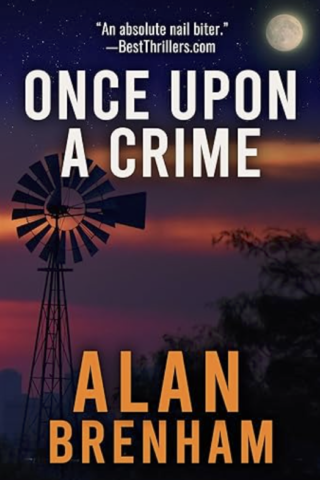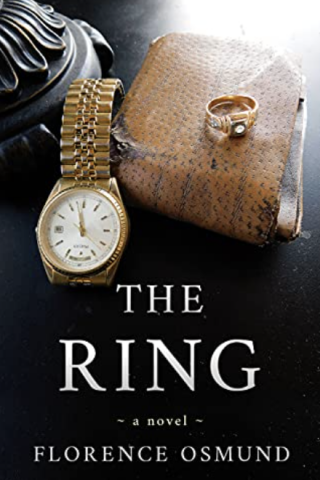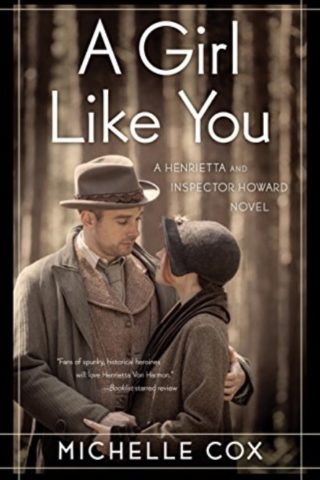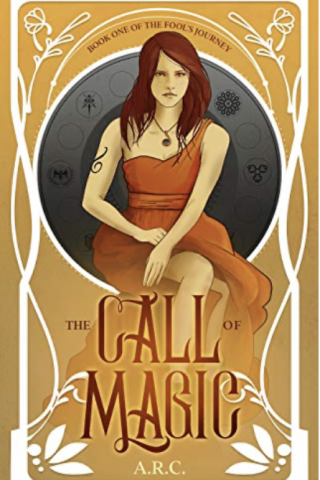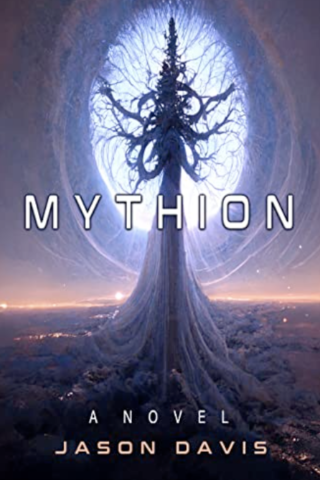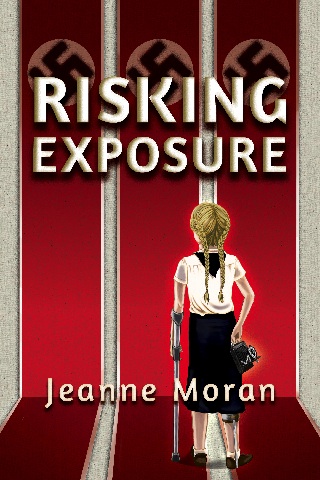
Description:
Munich, 1938. Nazi Germany. War is on the horizon. A timid Hitler Youth member contracts polio. Photographs she takes of fellow polio patients are turned into propaganda, mocking people with disabilities. She is now an outsider, a target of Nazi scorn and possible persecution.
Her only weapon is her camera.

Jeanne Moran
e x c e r p t
[Web-Dorado_Zoom]
Risking Exposure
By Jeanne Moran
Text copyright © 2013 by Jeanne Moran
All rights reserved.
No part of this publication may be reproduced or transmitted in any manner without written
permission from the author. Contact
j44eanne@gmail.com for information.
ISBN-13: 978-1492179825
ISBN-10: 1492179825
Cover design by Michael Rausch
http://www.behance.net/michaelrauschdesign
For my sister Joyce, who taught lessons of love, joy, and human dignity without ever saying a word.
First they came for the Communists
and I didn’t speak up because I wasn’t a Communist.
Then they came for the trade unionists
and I didn’t speak up because I wasn’t a trade unionist.
Then they came for the Jews
and I didn’t speak up because I wasn’t a Jew.
Then they came for me.
By that time, no one was left to speak up.
-Pastor Martin Niemöller
Chapter One
Snapshots
Munich, Germany
16 April 1938, Saturday
When Werner ordered me to grab my camera and follow him into the woods, I obeyed. He was the Scharführer, the Master Sergeant. What else could I do?
My best friend Rennie bolted to her feet alongside me. “You don’t need to go everywhere Sophie does, Renate,” Werner said to her in his usual high-pitched whine. But she ignored him and winked at me as we crashed through the underbrush. Rennie got away with a certain level of disobedience. Younger sisters can.
But I wasn’t Werner’s sister. I couldn’t risk it.
The three of us scared up rabbits and birds as we tromped along. We stopped at a small shed, and there in a hollow lay a large dog the color of a golden sunrise. Several clumps of fur wriggled against her belly.
“Puppies!” Rennie rushed over, dark curls bobbing, squatting so close that the mother lifted her head and growled. Rennie stood and stepped back, her smile undimmed.
Werner crossed his arms as if warding off disease. “The mother doesn’t have a tag. Probably a stray.”
I watched the tiny pups. Two were still, probably sleeping, one of them pale like its mother. Three others squirmed and nursed, their eyes still closed, their coats dappled in shades of brown and black. “How old do you think they are?” I asked.
Werner didn’t answer, just pointed at the ground a short distance from the mother’s muzzle. “Photograph that, Adler.”
A dark pup, its limp body camouflaged by dirt and decaying leaves. Rennie squatted beside it. “Poor little thing.”
I hurried my eyes away from the pitiful creature. “You want a photograph of a dead puppy?” I asked.
“It’s an example of nature’s way. The mother rejected that pup because he’s deformed,” he said, his tone matter-of-fact. “He’d do nothing but waste the milk meant for the able-bodied. A useless eater.”
A breathy objection came from Rennie. “That’s so cruel,” she whispered.
But I didn’t say anything. I just pulled out Papa’s camera and began to adjust my settings. I’d have to look at the poor thing through the camera lens. It might make me sick to my stomach.
Then Rennie’s voice brightened. “I think the pup’s alive,” she said. I lowered my camera.
She cooed at the creature as she made a small bed of leaves around it. Then she lifted and nestled the pup, leaves and all, at the mother’s teat, whispering soothing words the whole time. The tiny pup raised its wobbly head and searched until its mouth found nourishment. That’s when I saw the deformity – one of the pup’s hind legs was mangled, not bloody but sickeningly crooked. This puppy would never walk. I had to turn away.
Werner stepped back and stared at his sister, disgust clear in his squinted eyes and pursed lips. “You’re interfering with the natural order of things. Back to camp. And make sure you wash. Who knows what contamination…” He stalked off, shuddering.
As we followed, I stole a backward glance. The mother was using a forepaw to nudge the deformed pup away from her belly, away from her milk. I hurried to catch up with the others.
Rennie and I wove through clusters of boys working in their dirt-streaked uniforms, past rows of tents and campfires. One tent sat apart from the others. It was turned about-face so its back faced the campfires and its flaps faced the woods. Rennie gestured toward it with her thumb. “Werner’s,” she mouthed. I giggled.
Sure enough, a flap opened and he stepped out, straightened, and marched to the nearest fire. As usual, he was immaculate, his frame, short and wiry for an eighteen-year-old, neatly tucked into a crisp spotless uniform and gleaming shoes. I glanced down at my own scratched shins, the muddy streaks on my leather shoes and the burrs and twigs stuck to my blue uniform skirt. How did he freshen up so quickly? Did he have a clothesline full of pressed uniforms in that tent? I wanted to ask Rennie so we could share another giggle, but his march took him right past us.
He glanced down his long thin nose to his watch. “It’s twenty minutes before meal time,” he announced to no one in particular. “Are all the girls’ troops here?”
Anna, leader of our girl’s Jungmädel troop, rose and threw her shoulders back. In an identical announcement tone, she said, “The other troops and their leaders are late. My troop is the only one here on time.” She kept her gaze on Werner, no doubt waiting for a compliment about her efficiency. When a few heartbeats passed and the compliment didn’t come, she deflated onto a fireside rock.
Rennie whispered, “Anna should forget about nursing school and take up acting.”
“But not for an audience of children,” I added. In a few days, Anna was leaving her role as Jungmädel leader and none of us girls would be sad to see her go. With us, she’d always been quick with a harsh scolding and slow with a kind word. When adults commented how polite and disciplined we were, she’d smile and soften her voice and tell them how it was all because of her. She alone had sacrificed and slaved to mold us into the fine young girls we were. She alone had taught us to listen and be respectful and responsible. As if our parents hadn’t done that from the day we were born.
Rennie agreed. “She puts on a great show for adults.”
“Maybe her patients will appreciate her drama,” I said. But I doubted it.
Using a thick cake of brown soap, we washed at an old water pump near the campsite. Trudi, one of the youngest girls in our Jungmädel troop, ran up, out of breath. She worked the pump handle to splash the icy water into her filthy cupped hands, then slurped it eagerly.
“What are you doing?” I asked, a little disgusted.
She looked sheepish. “Getting a drink. Lost my canteen.”
I didn’t want to sound like Anna, so I spoke more gently. “You need to wash with soap and water before you drink from those hands.” I pulled my canteen from my rucksack and let her drink all she wanted, then refilled it from the pump. “We can share this,” I shook the full canteen, “until we get home.”
“You won’t tell Anna?”
“It will be our secret,” I told Trudi. No sense Trudi getting scolded for an honest mistake. In a few days time, neither of us would ever have to deal with Anna again.
The girls from my troop were scattered among a few different campfires. Trudi joined her little friends where they huddled together, giggling and pointing at the older boys. Rennie gestured toward an adjacent fire and we settled on a couple rocks. That’s when I noticed the person stirring the cook pot at our fire was Erich. Erich the Beautiful I called him, but he didn’t know that. I felt heat rise to my cheeks and groaned inwardly.
Erich looked up and swept his chocolate eyes between us, smiling. When he spoke, the small cleft in his chin danced. “Food’s almost ready.”
I was determined to act naturally, not to let on that my pulse was racing. “Smells good. Stew?”
He nodded. “Real campfire stew. Bits of potatoes and carrots, an onion or two, a little meat. Some wild mushrooms collected by that troop,” he poked his thumb toward a nearby cluster of boys.
My stepbrother Klaus folded his long frame onto a rock across from me. Rennie chattered to him, sharing details of the exhibit we’d seen earlier that day before we arrived for the cookout. When Rennie took a breath, Klaus turned to me. “You’re quiet today, little cat.”
Before I could answer, Erich spoke up. “I’ve always wondered, Klaus,” he said as he placidly stirred the stew, “why do you call Sophie ‘little cat’?”
One corner of Klaus’ mouth lifted and I turned my hot face to the ground. “Sophie used to have this little cat, Minka. When all was quiet, Minka roamed the house, catching mice downstairs in the bakery, sitting in sunbeams in plain sight. But the moment there was trouble, zoom!” he slid one palm forward over the other, “that cat ran and hid and couldn’t be found.” He smirked. “Sophie’s the same way.”
Erich stared at the pot, and thankfully the awkwardness ended when Marie and Uta greeted us and perched on nearby stumps. Marie was quite an athlete, keeping her dark hair cropped short in a no-fuss, always-ready-to-run style. If Uta weren’t my friend, I’d be jealous of her beauty and confidence. She filled out her white uniform blouse and blue skirt with womanly curves. She smiled flirtatiously as she chatted with the boys at our fire, tossing her nut brown hair and drawing their eyes to the places where its waterfall landed.
We were all fourteen, Uta and Marie and Rennie and me. The three of them had developed, blossomed as my mother would say. Not me. I still had a little girl’s contour, pencil straight from top to bottom. I lifted the stubby ends of my straw colored braids, flaring below their elastics like bristles of a paintbrush. I tossed them behind my shoulders.
“So, what will you boys compete in tonight?” Marie flashed her best smile at my stepbrother. She recently started talking about Klaus’ defined muscles, the wave of his sandy hair, and the sky blue of his eyes. She was getting as boy crazy as Uta. “Are you boxing, Klaus?”
He nodded and grinned. He’d won a dozen ribbons in Munich boxing competitions. “Boxing and throwing.”
“Throwing?”
Klaus peered at her. “We throw rocks for distance and accuracy. It’s training for the real thing.”
“The real thing,” Marie repeated, obviously not understanding.
“Grenades.” He grinned at Marie’s raised eyebrows. “Does that shock you?”
She nodded. It shocked me as well. I kept forgetting that in another year, Klaus would enter the Wehrmacht, the German Army.
Erich’s friendly tone broke the serious mood. “I’m in two races – a wheelbarrow race and a three-legged race.”
Klaus sniffed and steadied his gaze on Marie. “Who’s more prepared to restore Germany’s honor, someone who runs a three-legged race,” he glanced at Erich, “or someone who can throw a grenade to a target?”
Erich didn’t follow Klaus’ lead. “Half the fun of the three-legged race is messing up and falling,” he said smiling. “What happens if you mess up with explosives? Pshew!” He blew air past his teeth and threw his hands in the air. Rennie and I giggled, but Marie and Uta didn’t. Neither did Klaus.
Three more Jungmädel troops arrived at the campsite and Werner’s accusing whine echoed above the chaos. “You’re late.” He stood atop a rock, hands on hips, overseeing all. “Find a seat so we can eat.” The girls and their leaders hurried to obey.
As Scharführer, Werner was the leader of five troops of Hitlerjugend, Hitler Youth boys aged fourteen to eighteen. Even though each girl’s troop had its own female leader, he was also in charge of us somehow, all Youth from our Munich neighborhood, boys and girls ages ten to eighteen. That meant he’d still be in charge of us fourteen-year-old girls when we pledged to BDM, Bund Deutscher Mädel, the Hitler Youth branch for girls fourteen to eighteen, in a few days. Once I pledged, I’d be the official Youth photographer for all the troops in our region of Munich. I could hardly wait.
A few of the youngest girls from my troop wandered over looking for a place to eat, including Trudi. I gestured her to sit next to me, then slipped my canteen between us so we could share. She glanced around, looking for Anna no doubt. Once she saw that Anna’s attention was fixed on trying to catch Werner’s eye, she relaxed. She smiled at me a few times as she sipped from my canteen. We ate our stew in peace.
We were nearly done when the last group of girls finally showed up. Werner’s voice cut through the dinnertime chatter. “Falling behind may have cost you girls your dinner. When those who were here on time have finished, you latecomers can eat what’s left. If there is anything left.” He looked toward our campfire. “You, Lange!”
My stepbrother bolted to his feet, his mess kit clattering to the dirt. “Ja!”
“Oversee the clean-up of the meal. Activities begin in,” Werner glanced at his watch, “fifteen minutes.”
“Ja, mein Scharführer!” Klaus strode down the rows of tents, barking orders as mess kits, spoons, and pots clanked and banged.
“You, Adler.” Werner pointed at me. “Take photos of tonight’s activities for our newsletter.”
Quite an honor since I wouldn’t take my official position as Youth photographer until I pledged in a few days. I was thrilled, and Rennie squeezed my arm.
Werner’s voice whined again, and most of us turned to look at him. “I witnessed a lesson in nature today, a lesson our Fatherland has embraced.” He waited until clanking pots and background chatter halted before he continued. “A short time ago, off behind those trees, I found a mother dog and her pups.”
Several girls said “Aww.” When Werner scowled at them, they quieted and lowered their eyes.
“One of the pups was weak and deformed, a useless eater,” he continued. “Its own mother pushed it away so her good milk might be saved for pups which could grow up strong and capable.” He stared over his nose, turning slowly to face each cluster of Youth in turn. “Our Fatherland embraces this teaching from the natural world. Germany too is ridding itself of all who would pull strength,” he gestured around him, “from strong, capable young like you.”
Rennie mumbled something. Abruptly Werner said, “Did you have a something to add, Renate?”
She rose, face flushed. “I brought the deformed pup back to its mother. It was nursing when I left.”
I didn’t have the heart to tell her what I’d seen.
Werner waved a hand dismissively. “Nature will take its course. By now, the mother has probably rid herself of that burden once and for all.”
Rennie drew a breath and Erich’s brow knit, but they stayed silent. When I rinsed my mess kit a short time later, Erich ducked into the trees.
The activities began on time of course, starting with a parade. We girls sat on the ground and watched as two rows of HJ marched onto the field. I handed Trudi my canteen and faced the oncoming columns of boys with my camera.
Action shots. I wasn’t very good at action shots. Adjust settings. Click.
As the Scharführer barked commands, the boys went through maneuvers turning this way and that, performing push-ups and calisthenics, counting their repetitions in unison. I hoped the photos would show activity, not just blurry movement. Adjust settings again. Click.
The boys broke formation and sat with their troops. The competition started with the wheelbarrow race followed by the three-legged race. Click. Click.
Those of us watching cheered and hollered, urging the pairs on, and behind the camera I cheered wildly for Erich. He and his teammate finished second in both races, laughing and clapping each other on the back. Most of the boys in their troop congratulated them, but I noticed Klaus was silent, his lips pressed shut, as if concentrating on something only he could see. A still shot. My favorite. Click.
The next event, the throwing contest, involved one boy from each troop throwing a potato-sized rock. Click. Klaus won by landing his within a meter of the target. I should have been proud but as each rock thudded to earth, I pressed my eyes closed, my mind’s lens picturing an explosion.
After some great fun in a baton relay and a piggy back race, two boys from each troop readied for boxing matches. Klaus faced a boy his size, their expressions serious and intimidating. Rennie tugged at my sleeve. “He looks like a regular Max Schmeling.”
I grinned at her. “He’d be glad to hear that.” Judging by the framed magazine cover on his bedroom wall, Schmeling, a former heavyweight world champion, was Klaus’ favorite.
When Werner blew the whistle, all started normally, pairs of boys circling each other, fists at the ready. But within a minute, the five fair contests had turned into brawls with boys shoving each other, staggering, throwing punches as well as kicks. Blood and spittle smeared faces, filth covered uniforms. I watched from my safe place behind the lens, sickened but somehow unable to turn away.
I focused on Klaus. His opponent kicked him square in the shins. Klaus pounced, knocking him onto his back. They grappled and rolled in the dirt, first one of them on top, then the other. In less than a minute, Klaus’ opponent was face down and he had sprawled on top, twisting the boy’s arm behind him. The boy struggled to free himself, to push up or roll away, but Klaus overpowered him. He yanked the boy’s hair, lifting his head to reveal a bloody nose.
Beside me, Rennie made little choking sounds. I knew her thoughts were the same as mine. This wasn’t boxing; it wasn’t sport. This was a fight.
I used my camera as a spyglass to view the reactions of the other spectators. Most continued to clap and holler their approval, including Marie and Uta and Anna. Little Trudi and her friends sat near the front of the pack, faces hidden behind their hands. Erich watched in stone-faced silence, fists clenched in front of his knees.
Werner stayed focused on the fights, grinning. Finally he blew the whistle and Klaus jumped to his feet and punched his fist in the air. The winner.
It was only then that I realized – I’d watched the whole match hidden behind my camera but hadn’t taken any pictures. I might be in trouble for that.
“Last event of the day,” Werner announced as the filthy, bloodied fighters staggered and swaggered to rejoin their troops. “The only event in which our guests, the Jungmädel troops, will participate. The human pyramid.” He turned to Anna. “Your troop was the first to arrive, so the honored place at the top of the pyramid is yours. To whom does it go?”
Anna rose and straightened. “Renate Müller, mein Scharführer.”
I grabbed Rennie’s arm as she drew in a breath. Werner’s eyebrows shot up. “My sister? Indeed.” Then back to business, he gestured to the boys. “One from each troop.”
The boys pushed their representative into the open. The three largest boys hunkered on all fours, and two others scrambled on their backs to create the second level.
Werner hooked his finger at Rennie. “Come, Renate.”
She rose and slid from my grasp. Everyone bolted to their feet. Voices cheered her on, clamoring for her to hurry up the boys’ posed frames to her perch at the top.
She stepped deftly onto one boy’s back while reaching to the second row. As she lifted herself and groped for a hand hold, she teetered, off-balance. I held my breath. Several seconds passed and the boys readjusted, steadying the shifting pyramid. One of Rennie’s knees reached the back of a boy on the second row. Then she gained purchase and pulled up the other knee to settle on all fours. Once there, she grinned in triumph. A huge cheer rose and I whooshed out my breath.
From the growing shadows behind the pyramid, two pairs of figures appeared, each duo lugging a cook pot. In the blink of an eye, two pots of icy water splashed onto the backsides of those in the pyramid, dousing them, shocking them. The pyramid toppled in a tangle of screams and limbs.
I ran into the wet slippery chaos. “Rennie!” I called. “Rennie, are you all right?”
Relief coursed through me when I found her lying on her back, laughing. She brushed a clump of muddy hair back from her face. “I wondered how I’d get down.”
Chapter Two
Background
20 April, Wednesday
After our BDM pledge ceremony, Rennie and I found my father at the reception behind a table spread with cakes. I leaned into his sideways hug and inhaled. The scents of our family’s bakery clung to him, sweetness and yeast breads. Papa’s scent.
He kissed my forehead and used my pet name. “Do you feel all right, my Sophiela?”
“I guess that flu’s still bothering me.” A nagging headache and nuisance body aches had been my companions since the weekend cookout.
He slid pieces of cherry-laden chocolate cake onto plates. “Can you help me serve?”
“Schwarzwälder Kirschtorte! My favorite.”
“That’s why I made it.” He smiled, crinkles around his eyes showing his pleasure. When Werner spotted us and started over, Rennie and I grabbed plates and ducked into the crowd.
“I understand your father is leaving with the Wehrmacht soon,” a Party officer said to me.
“Friday,” I answered flatly. I didn’t want to think about it.
“And he’ll be a baker for our glorious soldiers?” another officer asked while chewing my father’s confection.
“No, a photographer.” A few years earlier, a customer short on cash had taught Papa photography in exchange for some of our bakery’s bread. Three lessons later, Papa was hooked. He bought his own camera and sold some shots to local magazines and newspapers. The bakery was our family’s livelihood, but photography was Papa’s heart.
Mine too, ever since I’d first gone with him to a camera store in Schwabing, Munich’s artsy part of town. The shop owner led us into a tiny room in the back and closed the door. He clicked on a lamp which made the room glow orangey red and used tongs to lift a single paper from a liquid-filled tray. As it hung there, dripping, and then was lowered into another tray, something happened. The blank paper filled with faint shadows. The shadows took on shape and substance until there, on that wet paper, was an image I knew from my own mirror – my shy smile and frizzy braids, captured forever by the magic of Papa’s camera.
I started squirreling away my delivery tips to buy a camera of my own. In a few weeks, I’d have enough to buy a battered old box camera I’d seen in a pawn shop. Not great quality, but it would be mine.
Rennie and I moved to offer cake to Helga, our troop leader now that we were in BDM. Werner joined us, fisted hands on his hips. “I need Adler to photograph a special HJ event on Monday,” he told Helga.
“If it’ll help the cause,” she said, accepting the cake, her toneless voice obedient but disinterested.
“What’s the event?” I asked. I’d have to borrow a camera. Again.
I smelled yeast and felt a gentle nudge behind me. “More cake, anyone?” Papa leaned in, plates in hand. “Last few pieces.”
Werner grabbed one without so much as a danke and said, “Your daughter’s agreed to show the world the wonderful training of our Youth. How discipline and camaraderie make the Reich strong.”
Papa turned to me, his steel gray eyes searching my face. He said “Excuse us” to the two leaders, grabbed my elbow, and led me a couple steps away. “Is that what you choose to do, my Sophiela? To help the Scharführer?”
“I’m the Youth photographer now, Papa. The leaders will tell me what events they want photographed.” It seemed pretty simple to me.
He dropped his head. “Not you too.” Then he lifted his eyes to meet mine and softened his voice almost to a whisper. “You still have a choice. Only you can decide if your choice is worth the cost.”
That sounded serious, far too serious with all these people around. I matched his whisper. “I want to practice photography whenever I can.”
He nodded thoughtfully. “Then you will need a good camera of your own. Since the Wehrmacht will give me a new one, you may have mine.”
I threw my arms around his neck. “Oh, Papa!” His camera was much better quality than that box camera I’d planned to buy. “I’ll take good care of it.” The two Youth leaders ate their cake with eyebrows raised and heads cocked, pretending not to listen.
“I am not worried about the camera,” Papa said, studying my face. “I am worried about…” He hesitated. “Photograph the truth, my Sophiela. The whole truth. Promise me.”
What could be photographed except truth? A camera only sees what’s there. I looked Papa in the eyes and promised.
After the reception, everyone in HJ and BDM left for a joint activity. Everyone except me. My parents refused to let me go, saying I’d had enough excitement for one day and needed rest to get over that pesky flu once and for all.
At home in the apartment above our bakery, Mutti closed herself in the bedroom, probably to start her nightly rosary. I set out two china cups and saucers while Papa lit the burner and placed a kettle on the iron stove. He settled a thick black record on the gramophone and lowered the brass tone arm. Noisy scratches gave way to a gentle piano solo. Für Elise.
He swept his arms wide and bowed. “May I have this dance, my Sophiela?” I took his hand and right there, in our tiny kitchen, we waltzed.
I closed my eyes. Without my vision, my awareness increased. The high hum of the heating kettle, the delicate music’s rhythmic urgings, the yeasty scent on my father’s clothing, his hand’s steady pressure on my back guiding my dance steps – each expanded and filled me, leaving no room inside for questions about puppies and choices, photos and the whole truth. The questions pushed to my lips and I opened my eyes. “Papa?”
But before I could speak, shouting outside grabbed our attention. A dozen HJ walked down the center of the street, laughing and clapping each other on the back. Klaus was in their midst.
My father bristled. “Go to bed, Sophie.” His tight lips and narrowed eyes spelled trouble for Klaus.
Hidden safely in my room, I pressed my ear to the closed door. Für Elise scratched to a halt. A clank of metal and a fading whistle meant the kettle was off the stove. A door opened and closed – Klaus was with Papa in the kitchen. “Tell me what you did tonight,” Papa demanded.
I could picture Klaus, chin in the air, self-assured. “I was at the Königsplatz on a Youth activity,” he said.
“Doing what?”
“What the Scharführer told us to do.”
“You smell like smoke. What did you burn?”
Klaus’ response was soft. I pressed my ear harder against the door.
“Books!” Papa bellowed. Another door opened and Mutti’s voice jumbled with the other two. Papa boomed over the clamor. “Those thugs burned books!” I pictured veins sticking out of Papa’s neck, a wild impassioned look on his face. So unlike the everyday Papa who waltzed and drank tea and played the Masters on the Victrola. I wanted to snap a photo of him, of Mutti, of Klaus, of the whole scene.
Klaus spoke up, his voice taunting. “What I do is not your concern, Hans.”
I gasped. Calling your stepfather by his first name. Completely disrespectful.
“Go to bed, Klaus. I’ll deal with you later.” That came from Mutti. Footsteps, then the door next to mine opened and closed. I turned my head and changed ears to listen better. “Why are you giving the boy such a hard time?” my mother demanded. “What Klaus and his troop did, they did in support of our Fatherland and our cause.”
“Our cause? Yours and mine? The children’s?”
“Of course it’s our cause. To restore pride to Germany.” A lot of adults talked that way, about how the treaty that ended the Great War was unfair and left our country poor and left our people without jobs. They said the Führer and the Party were fixing that, getting rid of job-stealing enemies and restoring our nation’s pride.
“Pride? Pride in what? Hoodlums? Bullies who threaten people and destroy property?”
I heard pacing. Papa, no doubt. I didn’t need to see my mother to know she’d be standing statuesque with her arms folded and her lips pursed. When Papa spoke again, his voice was softer. “Too bad I must leave so soon. I would rather stay home and guide the children.”
Mutti’s tone was crisp. “Klaus will serve the Reich by this time next year. He doesn’t need guidance. If Sophie does, I’ll give it.”
“Children need to hear both sides. Then they can decide for themselves.”
“What’s to decide, Hans? There is only one side. The side for Germany.”
“I am on Germany’s side.” Papa was struggling to keep his voice under control. “Twenty years ago, I fought for the Fatherland in the Great War. I will return to the Wehrmacht in a couple of days.”
Mutti sniffed. “Yes, but you won’t be fighting. You’ll be a photographer.” The way she said “photographer” sounded odd to me, as if she mocked it.
“The Wehrmacht needs photographers to document the soldiers’ lives, Karla, to bring their stories to the newspapers and to the German people.”
“Surely they need soldiers more, soldiers who will fight. Why aren’t you a soldier?”
I’d wondered that as well. But I never would have asked.
There was a long pause before Papa continued slowly, his voice thick. “Karla, I am a forty-three year old man. I have seen enough fighting. During the war…” He trailed off. “You heard stories, I am sure, from your late husband.” He quieted, and when he spoke again his tone held certainty. “I cannot march into another country and use weapons against the people who live there.”
This time, it was my mother’s voice that boomed. “You’re a coward, Hans Adler.”
I pressed a hand to my mouth to stifle a gasp. Poor Papa. I wanted to rush to his side, to bury my face in his yeast-scented shirt, to tell him that being my father, a baker, and a photographer was wonderful, that it was enough. But I didn’t. I stayed behind my door. Hidden, safe, and silent. Like Minka, my old cat. Shame filled me.
But I didn’t move.
Papa cleared his throat. “A true coward never questions what he is told. And cowardice spreads, Karla, like yeast. It grows and expands until it changes the very thing it inhabits…”
I didn’t have to wonder what I would have done in Klaus’ shoes. With dozens of my friends throwing books onto a bonfire, I would have joined in. Not because of some urge to burn books and get rid of the ideas of our country’s enemies. Just to hide in the group by doing what they do. Because refusing to join in would have drawn notice.
Papa would consider me a coward, too. I curled up on my bed and pulled the blankets over my head.
21 April, Thursday
The little suspended bell tinkled as I pushed open the bakery door. Mutti was in the food prep area looking quite Mutti-like, her square frame bulging over her calico apron and her hair sculpted into a graying bun. She peeled apples with frightening vigor. “Ah, Sophie. Go set the table.” She moved to the front door and flipped the sign to “Closed.”
Eine Kleine Nachtmusik flowed from our upstairs apartment. I followed its magnetic pull to my father. “Ah, you are home, my Sophiela. How was school?” He gestured me into our apartment with a sweep of his arm, filling me with the aromas of yeast and baked goods. Funny how I didn’t notice those same scents downstairs in the bakery. I only noticed them wherever my father was. And he was leaving.
I wanted to talk with him about cowardice and book burning and deformed puppies, but his tone told me I’d need to wait. “You must have heard your mother and me last night,” he said, touching my shoulder with such tenderness that I could have wept. “We will talk after dinner.” I ducked into the bathroom and splashed water on my face.
After dinner, while I dried my hands, he brought out his camera. “Here, my Sophiela. As promised.” Tenderly, he removed the black leather cover and opened the camera’s bellows. As he touched each knob and reviewed its purpose and function, he left white smudges on the sharkskin camera body. Flour. Even outside the bakery with his hands clean and his apron off, Papa still got flour on everything. He tugged at the bottom of his shirt and wiped, smearing the tiny grains around.
I placed my hand on his arm. “Please, Papa, don’t clean it up. It’s perfect.” There was so much I wanted to say, so much I wanted to ask. But that darn lump in my throat wouldn’t let me.
24 April, Sunday
The beautiful spring day was filled with sunshine and promise, the complete opposite of how I felt. Papa had gone to Austria with the Wehrmacht.
After Mass and a midday meal, I stuffed some schoolwork in my jacket pocket and jumped on my bike. My hair hung loose and my jacket unzipped as I rode so both hair and jacket whipped and flapped like wings. Too bad they couldn’t lift me and take me away.
I rode for a while through the English Garden Park, past ladies pushing prams and families having picnics. Eventually I found a quiet spot, settled on a bench, and spread the schoolwork across my lap. Math problems would keep me busy until Rennie met me for our weekly bike ride.
Then I noticed – I sat not twenty meters from a familiar scruffy clump of pine trees. How long had it been since I checked the pickle jar for a note from Esther?
I’d taken a few steps toward the trees when I saw him. Klaus strolled down a nearby path toward me. I settled back onto the bench and smoothed the papers into place.
He glanced around at the few nearby people. “Were you sneaking off somewhere, little cat?”
“No,” I stammered. I certainly wouldn’t tell him about the pickle jar – I had no idea what the consequences might be. “Just stretching my legs. I’m still stiff and achy from that flu. And math gets tedious.” I was rambling.
He didn’t seem to notice. “Especially tedious on a beautiful Sunday. Do you do homework in the park often?”
“I, I needed a little air. Mutti says fresh air and sunshine clears the head and heals the bones.”
He gestured to my tangled hair. “The latest Paris style?” I fumbled for an elastic and pulled my hair into it.
A familiar voice called, “Hi there!” Rennie bicycled to us, waving.
He grinned at her. “My sister is up to something, and she won’t tell me what. Please, Renate, talk Sophie out of spending this beautiful Sunday,” he emphasized the next few words, “on something useless.” With that, he strode away.
Useless. Why did that word bother me so?
Rennie settled in beside me and studied my face. All I could say was, “Something about him…”
“Brothers.” She nodded in agreement. “Speaking of brothers, if you promise to keep it a secret, I’ve got a story about mine.” I agreed, of course. “The other day,” she began, “Werner scolded the grocer about how the cheeses were arranged.” She stood, mimicking Werner’s posture by peering down her nose. She waggled a finger at an imaginary display case and pressed a fist into her hip. “You need to put your strong cheeses,” she imitated his whine perfectly, “your Limburgers and Bleus off to one side so my Emmentaler,” she clutched her chest dramatically, “doesn’t pick up strange odors.” I giggled.
“And he’s getting crazier about getting sick.” She plopped beside me which made her curls bounce. “You know how he stays an arm’s length away from everyone?”
I nodded, remembering how he stepped away from her once she’d moved that puppy. The useless eater Werner had called it. That’s where I’d heard the word recently. Useless.
“Now he’s so afraid of getting sick,” she continued, “that he drinks a health tonic every morning and takes cod liver oil and a dozen vitamins. He’s taken to sleeping with a mustard plaster on his chest and a hat on his head.”
“I’d like to get a picture of that!” I said, laughing.
Rennie grinned, her expression conspiratorial. “Have you ever seen him when someone coughs or sneezes?”
“I don’t think so. What does he do?”
“This.” She stood, drew a sharp breath, and lifted her hands to cover her face. Then she bent at the waist, made wet spitting sounds, and rushed to a pretend sink. There she cupped her hands and lifted them to her face over and over, spluttering. Then she rubbed her hands together and wrung them repeatedly.
“All because of a sneeze?” I couldn’t stop laughing at her antics.
“A sneeze or a cough. Sometimes he even changes his clothes.” That got us started in another round of giggles. “It’s a good thing he doesn’t do that while he’s on duty as Youth leader. I can’t imagine fifty boys splashing their faces when someone sneezes.”
I shook my head. “I don’t understand.”
“The boys do what he does, like he’s the Pied Piper of Hamelin.”
I remembered the story. When the Piper played on his magic flute, rats poured out of homes and followed him. If the Piper turned, the rats turned. If the Piper stopped, the rats did too. Eventually, the Piper led the rats to a cliff where they fell off and drowned.
Rennie continued in a softer voice. “Can I tell you another secret?” Again I agreed. “I’ve thought about ways to change that story. Rewrite it.” I waited while she focused her thoughts. “A rat could bite the Piper’s ankle so he couldn’t walk. Or break the pipe so it doesn’t play.” A small smile twitched at the corner of her mouth. “Or maybe the whole pack of rats could turn on the Piper and push him off the cliff.”
I was surprised. Usually Rennie spoke so kindly.
She seemed embarrassed. “Horrid, I know.” Her silver eyes searched my face expectantly. “But I do think that sometimes. It makes me wonder how he’ll be after he goes through the Adolf Hitler School.” The school provided training for young men to become Schutzstaffel, elite SS officers.
“I didn’t know he applied.”
She nodded. “It’s a good place for him. He’d never make it in the trenches with the Wehrmacht. Too messy.” I had to agree. “But the school will give him more training on how to make people follow. That’s what I don’t like.” She patted my hand. “Your turn.”
“My turn for what?”
“Tell me a secret.”
My eyes darted to the pine trees and Rennie followed my gaze. “What? What’s there?” I remained silent, unsure if I should share that particular secret with anyone. Her voice tinged with hurt, she whispered, “Don’t you trust me?”
I shifted a little and turned to her. “Aside from my mother, I never told anyone.”
She glanced at the trees and then back at me. “Told anyone what? Come on, Sophie. You can trust me.”
That was true. Rennie was a good secret keeper. But I didn’t know what she’d think of me once she heard the story. I glanced around to make sure I wouldn’t be overheard, then leaned closer and whispered, “It’s about Esther Kauffman.”
Rennie’s eyebrows pulled together. “The Jewish girl from our class? Didn’t she move?”
I nodded. “When we were ten or eleven.”
Rennie turned to me, her silver eyes intent on mine, her whisper a match for my own. “What about her?”
I drew my knees to my chest and wrapped my arms around them. Protected like that, I took a deep breath and began. “Our backyards faced each other, so Esther and I played together often when we were little. We especially liked playing spy, looking for clues to something or other.” Rennie nodded, either remembering that fact or encouraging me to continue. “A couple years before they moved, the SA stationed an armed guard outside Herr Kauffman’s tailor shop because they were Jewish. His customers, even the loyal ones, were frightened away. His business dried up. The Kauffmans couldn’t afford to stay there and had to move.”
“You must have been sad to see her go.”
I shrugged. “Yes and no.” I lowered my head and spoke to the ground. “The SA scared me, with their uniforms and their guns. Plus I heard rumors about the Jews…” I chanced a brief look at Rennie and searched her face. Seeing no reaction, I dropped my gaze again. “I didn’t want anyone to know I had a Jewish friend. I was afraid I’d get in trouble. So I made sure we played indoors or in the courtyard behind our homes where no one would see us.”
It was probably only a few seconds before Rennie spoke, but it felt like an eternity. Her voice was soft. “Did you get to say goodbye?”
I nodded. “The night before they moved. Esther and I agreed to keep in touch with notes stuffed in a pickle jar and buried at the base of those trees.” I pointed. “When we were younger, we dug for clues there during our spy games, so we both knew the place.” I tipped my head toward Rennie and was glad to see a small smile there. “She and her father were just moving to the other side of Munich, so she expected to come here to the park from time to time.”
Rennie turned to me. “And your friendship with her would stay secret.”
I nodded. I wanted to ask her what she thought about that, if she’d still be my friend after this confession. Clearly it showed that I wasn’t a true friend, one who would stand by steadfastly. But somehow, this story had unplugged a dam and my words wouldn’t stop until all had poured out.
“The day they moved was the day our Jungmädel troop toured the Residenz Palace.” Rennie made a “Hmm” sound. She remembered the day, so I continued. “We walked single file to the Palace, all of us in our uniforms and Anna in the lead. We went right past the Kauffman’s shop.
“When we got close, Esther and her father were loading bags into a truck. They both waited, watching us. Someone at the front of our line sniggered and called them names. Maybe it was Anna, maybe one of the girls. I never knew because I was at the end of our line. Anyway, as I passed Esther, our eyes met. She took half a step toward me as if to reach out and hug me one last time.” I closed my eyes and pictured Esther’s silent expression, her dark eyes pleading for connection, for caring, for the friendship that had once been ours. My voice caught. “But I walked right past her. I was ashamed to show our friendship in public.”
Long silent moments passed and I peeked over at Rennie. She brushed the back of her hand across her eyes. “I knew Esther from school,” she said. “I could have stopped to say goodbye, too. So you’re not the only one.”
I shook my head. “You and Esther barely knew each other, but she and I were friends. I should have stood by a friend.” After a few shuddering breaths, I pushed on. “In those first months, we stayed in touch with notes in the pickle jar and she never mentioned how hurt she must have been. I shared news from our neighborhood – a new baby down the street, someone going on a trip, a film I’d seen at the cinema, that kind of thing. Her notes were different, sad and frightened. She wasn’t allowed in school anymore, and her father had to sew everything by hand since the Party took his sewing machine.” I shook my head. “He didn’t make much money. They had to share an apartment with other Jews, people they didn’t even know, just to make ends meet. Every time I read one of her notes…” I stopped to focus my thoughts.
“We wrote regularly, probably once a week, placing the notes in the jar when we could.” I closed my eyes again and tried to hold my breath steady. “One day, I noticed she hadn’t picked up my last note. Another week or two went by, and it was still there. I began to worry. When a month passed and that note was still there, I was afraid for her.
“So I told my mother everything and asked her what to do. She was horrified. She said I could get in trouble for having a Jewish friend. She told me to concentrate on pulling up my mathematics grades and forget about Esther and silly notes.” I sniffed. “How could I forget?” I lowered my legs, propped my elbows on my knees and leaned my forehead onto my hands.
Rennie’s hand rested on my shoulder. “When was the last time you checked for a note?”
I shrugged. “Probably a year ago.”
“Do you want to look now?”
I nodded slowly and, after making sure we were unseen, I led her to the spot. I scraped a stick across needles and soft earth which stirred up a sharp piney scent. Once the stick hit a hard surface I tossed it aside, scrabbling through the loose soil with my bare hands. When I’d cleared enough metal lid and glass to grab, I wiggled and tugged and pulled out the jar. Small globs of dirt spattered us. I twisted off the lid and pulled out the lone folded paper, musty and wrinkled. “This is the last note I wrote.” I showed it to Rennie. “We always signed with initials, just S and E. Part of our spy games.”
Rennie stared at the jar, its empty interior and its outside clotted with dirt. She shuddered. “It’s spooky, isn’t it? I mean, where did…” her words trailed off.
I responded slowly. “At first, I liked to think they were traveling on holiday, or maybe they’d left the country – I’d heard of other Jewish families doing that. But I’ve heard rumors, I guess we all have, about Jews going to work camps.” I stopped speaking and Rennie didn’t ask any more questions.
A few minutes passed and I stood, stretching my aching legs and back. “I don’t need this anymore.” I crumpled my old note and threw it in an overflowing bin several meters away. Rennie shoved the empty jar back in the hole and started to bury it, but I interrupted her. “I’ll throw the jar out too.”
Those dark curls of hers bobbed in a hopeful question. “What if Esther comes by someday? Don’t you want some way for her to get a message to you?”
I hesitated but eventually agreed. I guess it wasn’t risky, not really, and it did help me feel less guilty.
Since I’d already gone this far I forged ahead. “I hope you don’t think poorly of me for telling you the biggest secret of all.” Rennie’s eyes widened and I gulped. “When these horrible things happened to Esther, I was sad for her. But I was awfully glad they didn’t happen to me.”
There. I said it.
Rennie hugged me. We sat in silence for a long, long time.



